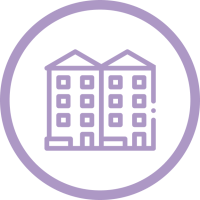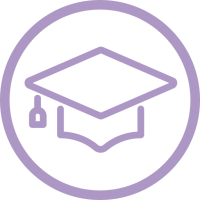The impact you have made in my life is immeasurable. Without this gift, I likeIy would not have had the means to finish my education
Focus Areas

Affordable Housing
We invest in essential housing throughout the West and Midwest. A prominent social driver of health, affordable housing provides many community benefits including increased consumer spending, job and economic growth, reduced evictions, and decreased homelessness. In addition, it provides stability for children who need safe, stable places to learn and grow.
Nation-wide, there is a shortage of 7 million homes for our country’s 11 million plus low-income families (National Low-Income Housing Coalition). According to the Salt Lake Chamber of Commerce, for the first time in 40 years, more Utahns are in need of a home than there are homes available. Since 1991, Utah’s housing prices have increased more than San Francisco, San Jose and Seattle. It is an issue that we all care about. Working with key partners, we are securing and preserving affordable units for seniors and working families so they have a safe, affordable, and peaceful place to live and work.
Since 2022, we have invested more than $80 million dollars in essential housing for working families and vulnerable seniors.
Senior Housing
Seniors have spent their entire lives living and working as members of the communities they reside in. Unfortunately, it can be difficult and costly to maintain a family residence that is far larger than most seniors need. Market-rate rental units can often be too expensive on a fixed income as well. Affordable senior living ensures that seniors can enjoy their retirement in the communities where they can live and thrive for a long time to come.
Workforce Housing
We believe that accessible and affordable workforce housing is crucial to the prosperity and growth of communities. The rapid rise in home prices, combined with increasing interest rates, means that many housing options available to working families are no longer attainable at reasonable prices. More essential workers, such as teachers, police, and firefighters, are forced to move out of the communities they call home. Workforce housing ensures that workers can live and thrive in the communities where they work and play.
Bridge Loan Program
Affordable housing communities and projects across the country are struggling to meet the demands of high interest rates and debt service payments. Many existing affordable housing projects with floating loan terms have created interest payments well above existing budgets, leading to smaller cash flows and difficult operating situations.
To address this need, the Call to Action Foundation launched a program that offers short-term bridge loans at below-market rates to help ensure projects can continue to operate and succeed even as interest rates plateau or increase.
Applicants must have at least 40% of units restricted to 60% or below AMI and an additional 35% of units at or below 80% AMI. Please note that these loans are extended only to eligible affordable housing projects located in the Wasatch Front, Utah; Carson City, Nevada; and Boise, Idaho. Loans do not apply to individuals.
To learn more about our Bridge Loan Program and eligibility, please click here.

Scholarships
The Call to Action Scholarship Program offers eligible students unparalleled assistance so they can achieve their academic goals. The need-based scholarship funds the full cost of attendance for four years ($25,000 maximum annually) at non-profit, regionally accredited public universities and colleges in Arizona, Colorado, Idaho, Iowa, Nevada, and Utah.*
*Please note that Arizona and Nevada have been added to the program for the 2025 scholarship cycle.
In addition to financial aid, our Scholars receive access to mentorship, academic counseling, leadership development, and personal and professional support.
Since 2007, we have awarded over $7 million in scholarships to students in need.
The 2025 Scholarship Program Application opened on January 1st with a deadline of February 21, 2025.
Important Notice: When you click on the application link above, you will be redirected to an external website to complete your application. Please ensure you have all necessary documents and information ready before proceeding.
Frequently Asked Questions (FAQs)
Frequently Asked Questions (FAQs):
Who is eligible to receive this scholarship?
- Be a graduating high school senior.
- Be a resident of Arizona, Colorado, Idaho, Iowa, Nevada, and Utah and meet all in-state residency requirements for college of attendance.
- Have a 3.0+ high school GPA.
- File a Free Application for Federal Student Aid (FAFSA).
- Have a goal of earning a bachelor’s degree within four years or an associate’s degree within two years.
What is required of scholarship recipients?
- Maintain a 3.0+ college GPA.
- Meet with the CTA Scholarship Advisor 2 times each semester (online or in-person).
- Meet at least 1 time per year with college academic advisor.
- Work or volunteer 500 hours each year, which includes paid/unpaid internships.
- Major in an approved degree (see CTA Approved Majors List below).
- Participate in CTA scholarship events.
- Send semester grade report to CTA Scholarship Advisor.
- Maintain good academic standing and refrain from engaging in misconduct or criminal activity.
What are the approved majors?
(as listed or similar):
- Accounting
- Aviation
- Biomedical Engineering
- Business
- Business Administration
- Chemical Engineering
- Chemistry
- Civil and Environmental Engineering
- Communication
- Computer Engineering
- Computer Science
- Construction Engineering
- Criminal Justice
- Data Science
- Economics
- Educational Psychology
- Electrical Engineering
- Elementary Education
- English Teaching
- Finance
- Geological Engineering
- Geological Science
- Graphic Design
- Information Systems
- Management
- Marketing
- Materials Science and Engineering
- Mathematics
- Mathematics Teaching
- Mechanical Engineering
- Metallurgical Engineering
- Nursing
- Operations and Supply Chain
- Physics
- Psychology
- Real Estate
- Secondary Education
- Social Work
What is included in the scholarship?
The need-based scholarship funds the full cost of attendance for four years ($25,000 maximum annually) at non-profit, public, universities and colleges in Arizona, Colorado, Idaho, Iowa, and Utah. This is a last dollar award.
When is the application deadline?
February 21, 2025, 5:00 pm MT.
Is this award renewable?
Yes. You must maintain a minimum 3.0 GPA and meet the requirements to be considered for renewal. Each year, you will receive an email notification with instructions to complete the online renewal application. You will need to provide a transcript showing your cumulative GPA.
Additional Questions?
Please email our scholarship advisor, at:

Food Security
An estimated 44 million people are faced with hunger every year in the United States, including more than 13 million children. Hunger knows no boundaries and it touches every community in the United States.
Since 2020, the Call Foundation in partnership with FJ Management's subsidiary Maverik, has helped provide over 16 million meals* to Feeding America in its fight against hunger. In 2023, Maverik’s food waste reduction program also donated over 500,080 pounds of food, which is equivalent to 416,733 meals* pounds of surplus food helping to provide over 433,401 additional meals. The food waste reduction program is active in more than 400 Maverik stores across 13 states.
*MealClaim - $1 helps to provide at least ten meals secured by Feeding America® on behalf of local member food banks.
_200x200.png)
Early Childhood
The Call Foundation’s Early Childhood Education and Early Childhood & Family Mental Health Grant Program supports organizations and initiatives that assist children (ages zero through eight-years-old), parents, caregivers, and teachers. The foundation seeks to ensure all children and families in Utah and our region have equal access to high-quality early childhood education and mental health services.
Our Strategy
A child’s early experiences have lifelong physical, social, and emotional impacts. While positive experiences position a young child for a stronger life, traumatic experiences during those early years may result in long-lasting, negative consequences. This early phase of life is critical for positive brain development and building a solid foundation for a healthy and successful life.
Research shows that Adverse Childhood Experiences (ACES) can harm a person’s health and well-being into adulthood, and may result in poor health outcomes like chronic disease, developmental delays, homelessness, sustained poverty, and increased risk for involvement in the criminal justice system. Unfortunately, children of color are much more likely to experience trauma and toxic stress and thus some of these negative outcomes.
High-quality early childhood education and mental health care support and sustain a child’s success throughout life. Early involvement in these programs supports educational attainment and success and increases earning potential. In short, healthy, well-educated children bolster full communities for generations.
